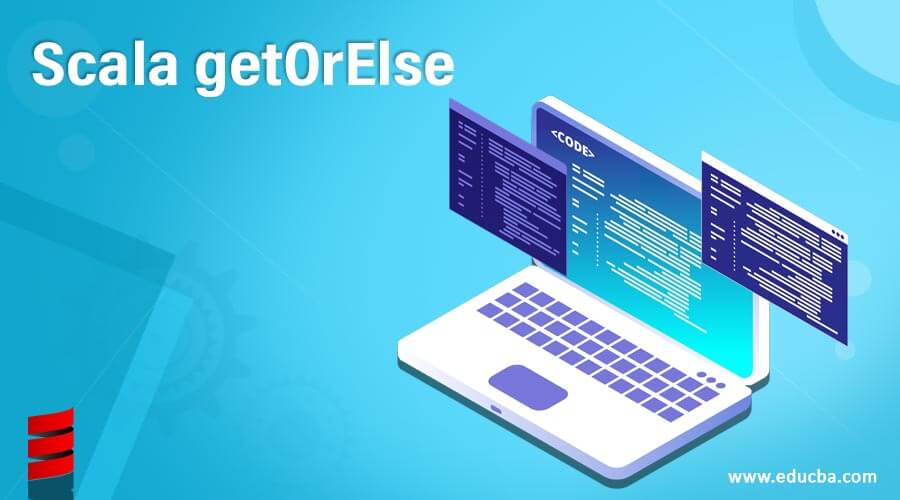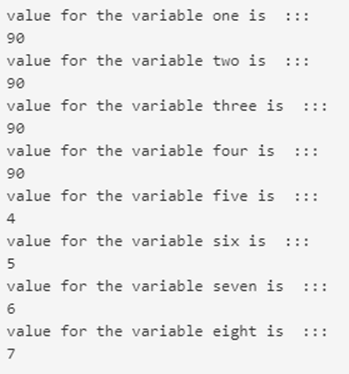Updated April 20, 2023

Definition of Scala getOrElse
This method is the part of option class in scala. Also, this method exists for both some and none class in scala. What it basically do is it just evaluates the value of the variable and return us the alternative value if the value is empty. This method works on two things success and fail. It will return us the actual value or the default value according to the response we get. This method is used to return an optional value.
Syntax
Below is the syntax for getOrElse methods as per the scala doc. This method will return us the optional value if the value is coming out to be empty otherwise it will give us the evaluates values or the actual value obtained. We will also see one practice example for better understand of syntax:
final defgetOrElse[B >: A](default: => B): BExample:
val myVar = toInt("200").getOrElse(10)In the above line of syntax, we are declaring our variable and here we are trying to type case the string into integer and passing one default value to the getOrElse if the value is empty.
How getOrElse Function Works in Scala?
As we know getOrElse method is the member function of Option class in scala. This method is used to return an optional value. This option can contain two objects first is Some and another one is None in scala. Some class represent some value and None is represent a not defined value. All these classes can be found in the scala. Option package.
Some of the extended class,syper types of option values are as follow see below;
1. Exteded class available in scala for getOrElse method;
- IterableOnce[A]
- Product
- Serializable
2. Linear type available in scala for getOrElse method;
- AnyRef
- Any
- io.Serializable
- Product
- Equal
3. Some of the known sub classes available in scala for getOrElse method;
None
SomeNow we will see one practical example and understand how it internally works;
object Main extends App{
// Your code here!
valx:Option[Int] = Some(100)
println("value for x is :: " + x.getOrElse(0) )
}In this example, we are creating one Option variable and assigning it a value 100 by using Some class in scala. After this we are using the getOrElse method get the value of the variable. But here we have initialized some value to the variable so the output will be 100 here. If we have not initialized the value the output would be the default value that we have assigned to the getOrElse method. In order to use this method, the variable should be the instance of Option here because we can use this method as the optional value for variable in scala.
Points keep in mind while working with getOrElsemethod :
- This method is used as an optional value provider in the scala if the input is empty.
- We can provide any alternative value by using this method.
- This method first evaluates the value and then return us the actual or we can say the calculated value.
- While using Option class one thing we have to keep in mind is we have two Object Some and None. Some takes value and None means not defined value.
- This method follows the success and failure approach which means success if value present fail if not present.
Examples of Scala getOrElse
Following are the examples are given below:
Example #1
In this example we are using the option class in scala to make use of getOrElse method. We have created two Integer variable for this to test.
Code:
object Main extends App{
// Your code here!
// defining the variable using Option
valy:Option[Int] = None
valx:Option[Int] = Some(100)
// using method getOrElse here for result on variable.
val result1 = x.getOrElse(0)
val result2 = y.getOrElse(0)
// printing out the output here .
println("value for the variable one is :::")
println(result1)
println("value for the variable two is :::")
println(result2)
}Output:

Example #2
In this example we are creating the string objects and using getOrElse method with them here.
Code:
object Main extends App{
// Your code here!
// define variable
valy:Option[String] = None
valx:Option[String] = Some("Hello some value here!!")
// call method here
val result1 = x.getOrElse("No value provided !!")
val result2 = y.getOrElse("No value provided !!")
// printing the result here
println("value for the variable one is :::")
println(result1)
println("value for the variable two is :::")
println(result2)
}Output:

Example #3
In this example, we are using more than one variable with getOrElse method n scala. By using some and none both class because we cannot directly call them on the normal variable it is not the function for them.
Code:
object Main extends App{
// Your code here!
// below we are using some class to define the variable
val variable1:Option[Int] = Some(90)
val variable2:Option[Int] = Some(90)
val variable3:Option[Int] = Some(90)
val variable4:Option[Int] = Some(90)
// Using None class
val variable5:Option[Int] = None
val variable6:Option[Int] = None
val variable7:Option[Int] = None
val variable8:Option[Int] = None
// Applying getOrElse method
val result1 = variable1.getOrElse(0)
val result2 = variable2.getOrElse(1)
val result3 = variable3.getOrElse(2)
val result4 = variable4.getOrElse(3)
val result5 = variable5.getOrElse(4)
val result6 = variable6.getOrElse(5)
val result7 = variable7.getOrElse(6)
val result8 = variable8.getOrElse(7)
println("value for the variable one is :::")
println(result1)
println("value for the variable two is :::")
println(result2)
println("value for the variable three is :::")
println(result3)
println("value for the variable four is :::")
println(result4)
println("value for the variable five is :::")
println(result5)
println("value for the variable six is :::")
println(result6)
println("value for the variable seven is :::")
println(result7)
println("value for the variable eight is :::")
println(result8)
}Output:

Conclusion
So getOrElse method can we used as an optional or a default value if the input provided is empty. We can use this in a scenario where we have to give some default value for the empty input. Also, it is very easy to use, readable and under stable by the developer, and also it is available for both Some and none class of Option in scala.
Recommended Articles
We hope that this EDUCBA information on “Scala getOrElse” was beneficial to you. You can view EDUCBA’s recommended articles for more information.


